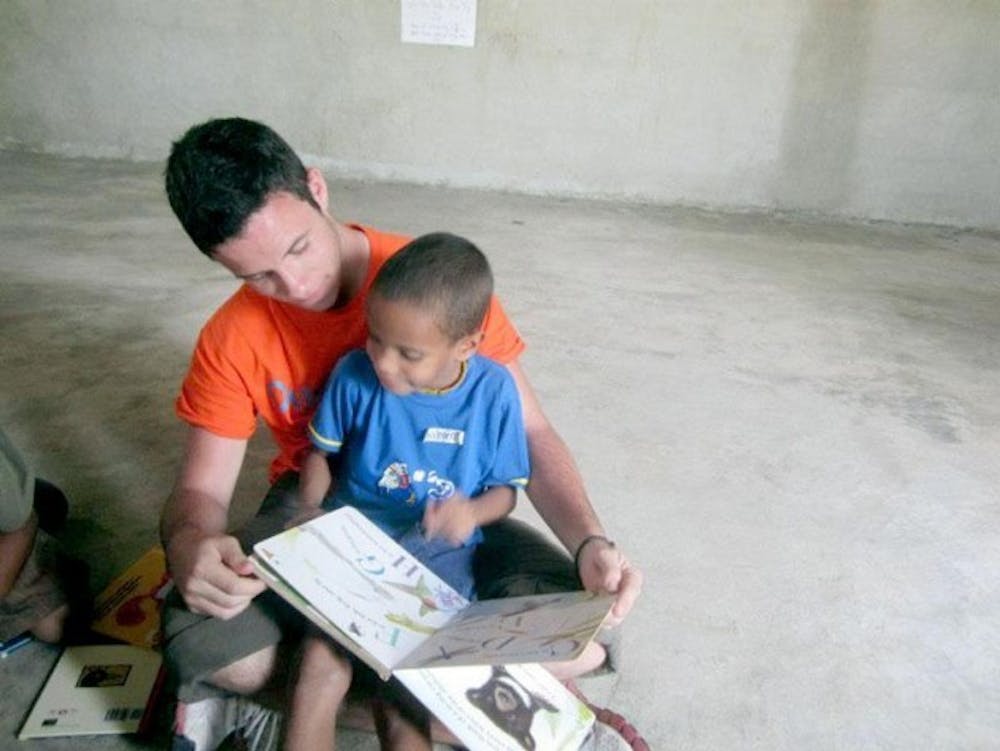Abby LaPlaca remembers sitting in the Dominican Republic heat, reading Dr. Seuss' Oh, The Places You'll Go! to a little girl who barely knew English.
Tears formed in LaPlaca's eyes when the same little girl started to read with her, and then, read to her.
LaPlaca, a sophomore Spanish major, was one of 34 students who travelled to Dominican Republic as a part of UB's Alternative Break Program. Offered by UB's Center for Student Leadership & Community Engagement (CSLCE), the program offers weeklong trips to international and national destinations, each one centered on a specific service goal.
According to Terri Budek, assistant director of Student Life and UB's Intercultural & Diversity Center, this year's trip to the Dominican Republic was centered on education.
The Alternative Spring Break trip was designed to "introduce students to a new culture and offer a unique volunteer experience," Budek said.
This was the second year the program went to the Monte Cristi province in the Dominican Republic.
UB students worked in collaboration with Outreach 60, an established volunteer organization with strong footholds in Nicaragua and Dominican Republic, according to outreach.org.
The organization allowed college students - including UB students - to use its headquarters stationed in Monte Cristi as shelter for long-term volunteering. Outreach360 also provided daily meals.
Participants spent the week teaching English to children in the community, Budek said.While Outreach volunteers assisted students teaching, sophomore pharmacy major Andrew Wilsey, was surprised at the hands-off approach of the veteran volunteers.
"I was a little taken back because I thought that we would be helping someone [teach], but we were actually the teachers," Wilsey said. "One of the commandments for us to follow was: You are Outreach360. We weren't supposed to think that the outreach volunteers had more of a priority over us or that they were the real teachers."
According to LaPlaca, students had to walk three miles to the learning camps, where children would begin pouring in at 9 a.m. The age of the children attending the camps ranged from 5 to 12 years old.
Some children who didn't fit into the age requirement tried to sneak into the camp, LaPlaca said. Volunteers always let them in.
For Anokhi Patel, a sophomore biology major, the greatest part of teaching was the children's enthusiasm to learn. She said she could see the eagerness on their faces.
The children showed massive improvements near the end of the week, according to Wilsey. Instead of simply repeating words they heard from the students, the children were able to speak English words without knowing the spelling or someone saying it first. He believes the children's energy and drive to learn contributed to their improvement more than anything else. He believes it will continue to do so in the children's future.
A normal day started with a camp circle of songs. The volunteers would break up into stations - arts and crafts, vocabulary, literacy, recreation and conversations - and then the children were divided into groups that depended on age and gender, according to Wilsey. Props, books, games and repetition drills were used to motivate the children and to help make learning English easier.
In the Dominican Republic, parents usually prefer their child work with them by going to the farm and bringing in money. It's the kids who choose to come to school, Wilsey said. Some walk up to 10 miles to get an education.
"Just think about when you went to high school," Wilsey said. "There was never, 'Can I go to school?' It was always, 'Can I please stay in?' or something like that. It was just amazing to see how driven these kids are at 5, 6 and 7 years old."
Like many students who went on the trip, LaPlaca enjoyed the teaching experience and wants to pursue it as a career. She dreams of teaching English as a second language to children all over the world.
According to LaPlaca, going to the Dominican Republic to help teach children English has only motivated her more to work toward fulfilling her goal. She believes all students benefit from volunteering abroad.
"I really think this is something everyone should do," LaPlaca said. "You really just need to know what it is to serve and to experience a different culture and a different mentality; everyone needs to take a step out of their own life for a little bit."
Email: features@ubspectrum.com





